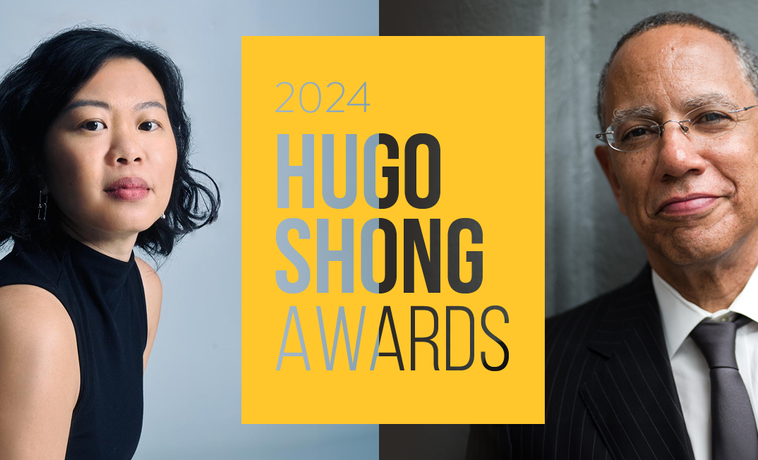COM Students Take Home National Grand Prize for PR Case Study

Caitlin Dickinson (COM'21) and Clay Patrick (COM'21) celebrate winning the Grand Prize in the 2022 Page Society and Institute for Public Relations Case Study Competition in Brooklyn. Left to right: COM Department Chair and Professor Donald Wright, COM Professor of the Practice Ray Kotcher, Dickinson, Patrick, COM Assistant Professor Arunima Krishna, Institute for Public Relations CEO Tina McCorkindale, and Page President Roger Bolton. Photo courtesy Page Society.
An eye for social justice in the corporate world earned recent Boston University College of Communication alumni Caitlin Dickinson and Clay Patrick the top award in a global public relations student competition.
The Jack Koten Page Principles Case Study Award recognizes students’ original analyses that best further the practice of corporate communications and is perhaps the most prestigious honor given to students of public relations in the country. The award is sponsored by the Institute for Public Relations and the Arthur W. Page Society, a professional association for public relations executives and educators.
Dickinson and Patrick’s submission examined how ride-sharing company Lyft stood up against Senate Bill 8 in Texas, a law that permits civil suits against anyone who helps a woman obtain an abortion.
To protect its drivers from legal action, Lyft created a defense fund. The company also publicized its pro-choice stance by donating to Planned Parenthood. Dickinson and Patrick examined how these actions impacted Lyft’s reputation and profits.
“Cait and I both went back and forth on the intersect of corporate social responsibility, authenticity, and ‘woke-washing,’ where a company takes an action to be perceived as more liberal or ‘with the times’ to appeal to young audiences but fails to continually advocate for their previous stance after the news cools down,” Patrick said in a statement.
According to Patrick, the Lyft case stood out due to its alignment with the seven Page Principles for successful public relations. These include directives such as “tell the truth,” “listen to stakeholders,” and “remain calm, patient, and good-humored.”
“This law is unique in that it weaponizes private citizens to enforce abortion restrictions, and it had the potential to derail Lyft’s operations for both drivers and riders in Texas,” Patrick stated. The case study found that while Lyft’s actions elicited mixed responses from the public, the company did not suffer significant financial repercussions.
Boston University Assistant Professor Arunima Krishna, who served as the students’ adviser, praised their “nuanced and thoughtful” investigation.
“Caitlin and Clay did an exceptional job with this case study, delicately balancing the discussion of an extremely polarizing issue with how corporations like Lyft can act and respond while keeping with their values.”
Dickinson echoed Patrick’s interest in exploring a company’s response to a politicized topic, especially since many organizations face public pressure to take a stand on hot-button issues.
The Texas law “can only be described as an attack on women’s access to healthcare. To circumvent federal precedents established by Roe v. Wade, the bill put the onus of enforcement on private citizens,” she said in a statement. “Clay and I were interested to see how Lyft, a company known for its inclusive culture and corporate social responsibility, would protect its customers and drivers in this case. As expected, the company stood for its values: Be Yourself, Uplift Others, and Make it Happen.”
This year’s competition drew 40 entries from schools across the United States, as well as from China, the Philippines, and Singapore. Dickinson and Patrick will discuss the study during an upcoming episode of the Page Society’s podcast “The New CCO.”


